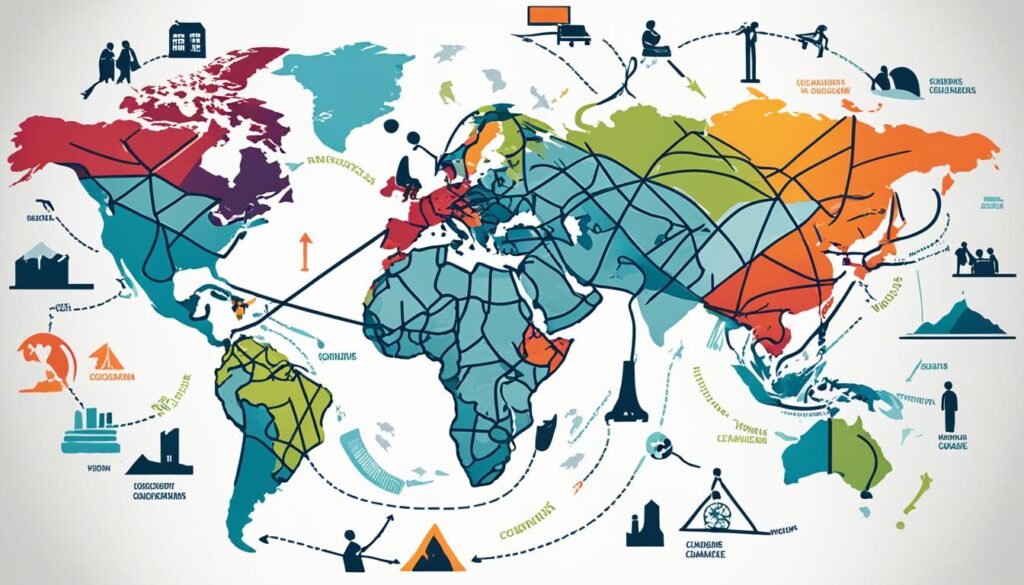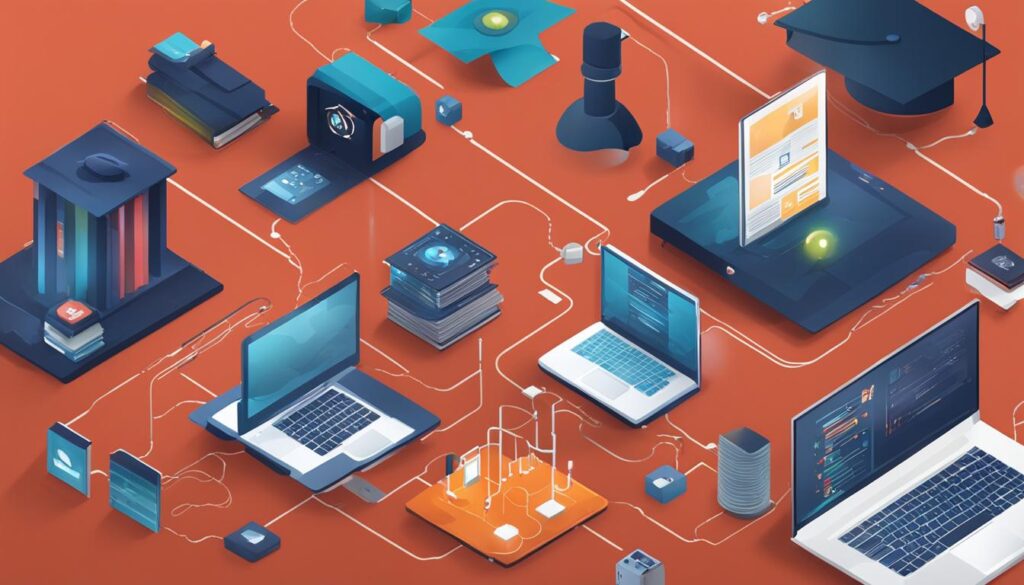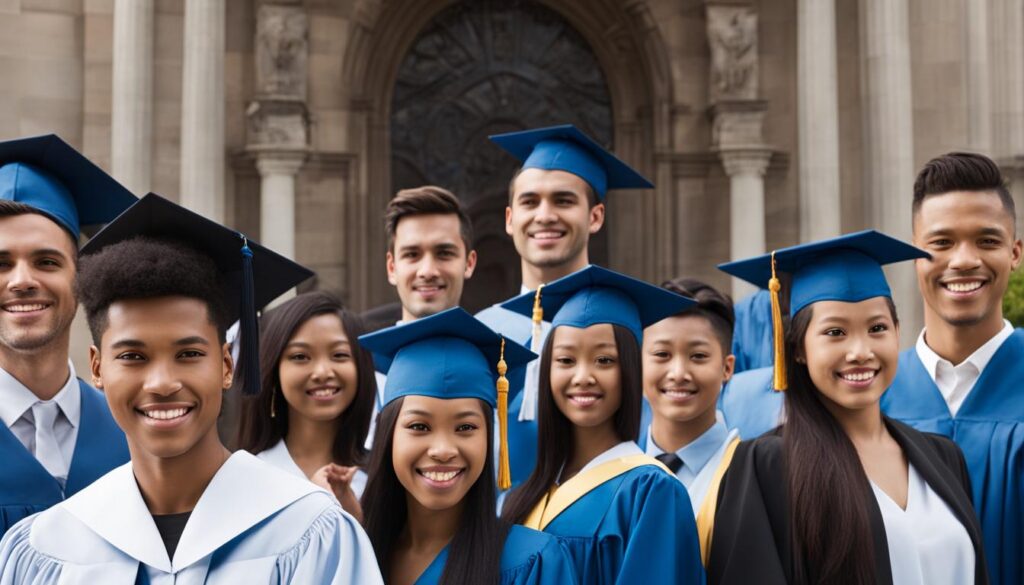In today’s ever-changing world, higher education plays a crucial role in equipping graduates with the knowledge, skills, and mindset necessary to navigate complex global challenges. The pursuit of excellence in higher education is a top priority for universities around the globe, as they strive to provide students with a transformative learning experience that prepares them for success in an interconnected world.
Top universities are dedicated to delivering quality education that goes beyond the classroom, fostering academic success and empowering graduates to make a meaningful impact on a global scale. Whether through innovative teaching methods, cutting-edge research opportunities, or experiential learning programs, these institutions are committed to preparing students to address the pressing issues of our time.
Key Takeaways:
- Higher education plays a crucial role in preparing graduates for global challenges.
- Top universities strive to provide excellence in education and equip students with the skills needed to tackle complex global issues.
- Quality education fosters academic success and empowers graduates to make a meaningful impact on the world.
- Innovative teaching methods, research initiatives, and experiential learning opportunities contribute to educational excellence.
- Graduates from top universities are well-prepared to address the pressing challenges of our interconnected world.
Embracing Global Learning in Higher Education
Integrating Global Learning Across Disciplines
Embracing global learning is essential for higher education institutions to prepare students for global challenges. By integrating global learning across disciplines, students are given the opportunity to develop a holistic understanding of global issues and their interconnectedness. This interdisciplinary approach encourages students to explore various perspectives and apply critical thinking skills to real-world problems.
Global learning fosters the development of skills such as cultural competence, empathy, and cross-cultural communication, which are essential in today’s diverse and interconnected world. By incorporating global learning into the curriculum, higher education institutions create an environment where students can explore global issues from multiple angles and develop a deeper understanding of the complexities of the world we live in.
Connecting Global Education to Career Readiness
In today’s globalized workforce, career readiness goes hand in hand with global education. By connecting global education to career readiness, higher education institutions ensure that graduates possess the necessary skills and cultural competence to thrive in a global work environment.
Global education provides students with the opportunity to develop skills such as adaptability, problem-solving, and cross-cultural communication, which are highly sought after by employers in a global marketplace. By incorporating global perspectives and experiences into the curriculum, higher education institutions equip students with the tools they need to navigate the complexities of today’s global job market.
Advancing Ethical and Intentional Global Collaboration
Advancing ethical and intentional global collaboration is another crucial aspect of embracing global learning in higher education. By fostering cooperation among individuals from diverse backgrounds, higher education institutions promote a collective approach to solving global problems.
Through collaborative projects, interdisciplinary research, and cross-cultural partnerships, students gain valuable experience in working collaboratively with others who may have different perspectives and cultural backgrounds. This form of global collaboration not only enhances the learning experience but also contributes to the development of solutions that address real-world challenges on a global scale.
Addressing Transnational Problems Through Educational Excellence
Educational excellence plays a vital role in addressing transnational problems effectively. By fostering a culture of excellence in higher education, institutions can equip students with the tools and knowledge to tackle complex global challenges. Through rigorous academic programs, research initiatives, and experiential learning opportunities, educational institutions can contribute to finding innovative solutions to transnational problems.
When it comes to transnational problems, such as climate change, poverty, or global health crises, finding sustainable solutions requires a multidisciplinary approach. Higher education institutions have a unique role to play in facilitating collaboration among students, researchers, and experts from various fields. By encouraging interdisciplinary cooperation, educational institutions can foster a holistic understanding of transnational problems, leading to more effective and innovative solutions.
Additionally, institutions can address transnational problems by incorporating real-world experiences and case studies into their curriculum. This approach enables students to apply theoretical knowledge to practical situations, preparing them to navigate the complexities of global challenges. By engaging in research initiatives that tackle transnational problems, students can actively contribute to finding solutions and make a meaningful impact on a global scale.
Experiential learning opportunities, such as internships or community engagement programs, also play a crucial role in addressing transnational problems through educational excellence. These experiences allow students to gain firsthand insights into the challenges faced by communities around the world. By actively participating in these experiences, students develop empathy and a deeper understanding of the interconnectedness of global issues.
“Education is the most powerful weapon which you can use to change the world.” – Nelson Mandela

By addressing transnational problems through educational excellence, institutions are preparing future leaders who can effectively tackle global challenges. By equipping students with the necessary skills, knowledge, and practical experiences, educational institutions contribute to creating a more sustainable and equitable world.
Higher Education Excellence: Pioneering Innovative Teaching and Learning
Higher education institutions are at the forefront of pioneering innovative approaches to teaching and learning, ensuring that students receive a dynamic and relevant educational experience. By reworking the curriculum to align with real-world challenges, these institutions enable students to apply their knowledge and skills to practical scenarios, fostering a deeper understanding of their field of study and its real-world relevance.
One of the key ways that higher education institutions are promoting real-world relevance is through the implementation of multi-disciplinary and interdisciplinary education. By encouraging collaboration among different academic disciplines, students gain a holistic understanding of complex issues and develop innovative problem-solving skills. This interdisciplinary approach breaks down traditional silos and allows students to see the interconnectedness of various fields, providing them with a broader perspective that can be applied to real-world challenges.
Through interdisciplinary education, students are equipped with the versatility and adaptability required to address the complexities of today’s global challenges. They learn how to think critically, draw connections between diverse areas of knowledge, and develop creative solutions that transcend disciplinary boundaries. By engaging in collaborative projects and experiential learning opportunities, students gain practical experience in navigating the complexity of real-world problems.
Technology’s Role in Academic Success
Technology plays a significant role in achieving academic success in higher education. With the advancement of advanced technologies, institutions are adapting to agile learning methods that provide flexible and personalized learning experiences.
Adapting to Agile Learning through Advanced Technologies
Agile learning, enabled by technology, allows students to learn at their own pace and access educational resources anytime, anywhere. Online learning platforms and digital tools provide students with the flexibility to fit their studies into their busy schedules, making education more accessible.
Additionally, advanced technologies such as artificial intelligence (AI) and virtual reality (VR) are revolutionizing the learning experience. AI-powered platforms can analyze student performance, identify areas of improvement, and provide personalized feedback, enhancing student engagement and overall academic success.
Embedding Artificial Intelligence and Virtual Reality in Learning
Integrating artificial intelligence and virtual reality into the learning process creates immersive educational experiences. VR technology allows students to explore realistic simulations, making complex concepts more understandable and engaging. This interactive and hands-on approach fosters deeper understanding and retention of knowledge.
AI-powered virtual assistants are also helping students in their educational journey. These assistants can provide instant answers to questions, recommend relevant resources, and even assist in managing study schedules. By leveraging these technologies, academic institutions are equipping students with the skills and knowledge necessary to thrive in the digital age.

| Benefits of Technology in Academic Success |
|---|
| 1. Flexible and personalized learning experiences |
| 2. Access to educational resources anytime, anywhere |
| 3. AI-powered platforms for personalized feedback and improvement |
| 4. Immersive educational experiences through VR |
| 5. AI virtual assistants for instant support and guidance |
Redefining Teaching Excellence in Prestigious Colleges
Teaching excellence is being redefined in prestigious colleges to meet the evolving needs of students and society. These institutions understand the importance of providing an exceptional educational experience that goes beyond traditional methods. By prioritizing innovative teaching methods, student-centered approaches, and creating a supportive and inclusive learning environment, prestigious colleges aim to redefine teaching excellence and provide graduates with the skills and knowledge they need for future success.
At these esteemed colleges, the focus is on adopting teaching strategies that engage students in meaningful ways. Professors incorporate interactive activities, group projects, and real-world applications to make learning more dynamic and relevant. This hands-on approach helps students develop critical thinking, problem-solving, and collaboration skills, preparing them for the challenges they will face in their careers.
The true value of a prestigious college lies in its commitment to understanding and meeting the diverse needs of students. By creating a supportive and inclusive learning environment, these colleges empower students to thrive academically and personally.
Prestigious colleges also prioritize creating a supportive and inclusive learning environment. They recognize that students thrive when they feel supported, valued, and included. These colleges promote diversity and inclusion by fostering an open and accepting campus culture. Faculty and staff go above and beyond to provide mentorship, guidance, and resources to help students overcome any barriers they may face.
Furthermore, prestigious colleges are committed to leveraging technology to enhance the learning experience. Incorporating educational technology allows for personalized instruction, interactive online platforms, and access to a wealth of digital resources. This integration of technology equips students with the digital literacy skills required in today’s professional landscape.
By redefining teaching excellence, prestigious colleges are paving the way for a transformative educational experience. They go beyond imparting knowledge and strive to develop well-rounded individuals who are ready to make a positive impact in their communities and the world.
Building a Foundation for Academic Excellence
To achieve academic excellence, it is crucial to build a solid foundation by fostering adaptability and curiosity in learning. Encouraging students to be adaptable and curious prepares them to navigate the complexities of the global landscape and promotes a lifelong love for learning.
Encouraging Adaptability and Curiosity in Learning
Adaptability is a valuable skill in today’s rapidly changing world. By encouraging students to embrace change and adapt to new situations, educational institutions help them develop the resilience and flexibility needed to thrive in various environments. Curiosity complements adaptability by promoting a mindset of continuous learning, exploration, and discovery. By nurturing curiosity, academic institutions inspire students to ask questions, seek answers, and pursue knowledge beyond the confines of traditional classrooms.
Adaptive and curious learners are better equipped to face challenges, think critically, and develop innovative solutions to complex problems. This mindset enhances their academic journey and prepares them to make meaningful contributions in their chosen fields.
Ensuring Quality Education through High-Impact Practices
High-impact practices play a vital role in ensuring quality education and enriching the learning experience for students. These practices provide opportunities for students to actively engage in their education, enhance their skills, and deepen their understanding of their chosen field of study.
Internships offer real-world experiences that connect classroom knowledge with professional settings. They allow students to apply theoretical concepts to practical scenarios, developing valuable skills and gaining industry insights. Service-learning combines community service with academic coursework, fostering civic engagement and promoting social responsibility.
Undergraduate research opportunities enable students to conduct independent research and collaborate with faculty mentors. These experiences cultivate critical thinking, problem-solving abilities, and a deeper understanding of research methodologies within their disciplines. These high-impact practices enhance student engagement and contribute to their overall academic success.

By integrating high-impact practices into the educational journey, institutions provide students with transformative experiences that broaden their horizons, develop essential skills, and nurture their passion for learning.
World-Class Institutions and The Quest for Inclusive Excellence
World-class institutions are committed to fostering inclusive excellence through their dedication to global learning initiatives. By integrating global perspectives and experiences into the curriculum, these institutions embrace diversity and provide a platform for multicultural understanding and collaboration.
In their pursuit of inclusive excellence, world-class institutions recognize the importance of creating an inclusive learning environment that values the unique contributions and experiences of every student. This commitment aligns with campus inclusion efforts, ensuring that global learning is accessible and inclusive for all.
Fostering Inclusivity Through Global Learning Initiatives
Global learning initiatives within world-class institutions prioritize inclusivity by intentionally designing educational experiences that expose students to various cultures, perspectives, and ideas. These initiatives foster a sense of global citizenship, encouraging students to embrace diversity and develop cross-cultural competencies.
Through study abroad programs, international partnerships, and culturally immersive experiences, these initiatives provide students with the opportunity to engage with the global community and gain a deeper understanding of the interconnectedness of our world. By promoting inclusivity through global learning, world-class institutions prepare students to navigate the complexities of an increasingly diverse and interconnected global society.
Aligning Global Learning with Campus Inclusion Efforts
World-class institutions recognize that inclusive excellence requires a holistic approach that extends beyond the classroom. By aligning global learning with campus inclusion efforts, these institutions create a supportive and inclusive campus environment that celebrates diversity and promotes equity and access for all students.
Through the implementation of inclusive campus policies, such as diversity and inclusion initiatives, student support programs, and resource centers, world-class institutions foster a sense of belonging and empowerment among their diverse student populations. By integrating global learning into these inclusive campus environments, institutions create opportunities for students to engage in meaningful dialogues, participate in cross-cultural collaborations, and contribute to a more inclusive society.

| Benefits of Global Learning Initiatives | Benefits of Campus Inclusion Efforts |
|---|---|
|
|
Conclusion
Excellence in higher education is essential for preparing graduates to effectively address global challenges. By embracing global learning, innovative teaching and learning methods, and a commitment to inclusivity, higher education institutions can shape future leaders who are equipped to make a positive impact on the world.
Integrating global learning across disciplines allows students to develop a holistic understanding of global issues and their interconnectedness. Connecting global education to career readiness ensures that graduates possess the necessary skills and cultural competence to thrive in a global workforce. Advancing ethical and intentional global collaboration fosters cooperation among individuals from diverse backgrounds, promoting a collective approach to solving global problems.
In addition, addressing transnational problems and leveraging technology play vital roles in shaping the next generation of global leaders. By fostering a culture of excellence in education, institutions can equip students with the tools and knowledge to tackle complex global challenges. Reworking the curriculum for real-world relevance enables students to apply their knowledge and skills effectively. Implementing multi-disciplinary and interdisciplinary education encourages collaboration and innovative problem-solving.
In conclusion, higher education institutions play a critical role in preparing graduates to navigate global challenges. By providing excellence in education, integrating global learning, redefining teaching practices, and leveraging technology, institutions can foster academic success and empower graduates to make a meaningful impact on a global scale.
FAQ
What is the role of higher education in preparing graduates for global challenges?
Higher education plays a crucial role in preparing graduates to tackle global challenges effectively and innovatively. Top universities strive to provide excellence in education to equip students with the skills and knowledge necessary to address complex global issues.
How do academic institutions embrace global learning?
Academic institutions embrace global learning by integrating it across disciplines, allowing students to develop a holistic understanding of global issues and their interconnectedness. They also connect global education to career readiness to ensure graduates possess the necessary skills and cultural competence for the global workforce.
How does educational excellence address transnational problems?
Educational excellence addresses transnational problems by fostering a culture of excellence in higher education. Through rigorous academic programs, research initiatives, and experiential learning opportunities, institutions equip students with the tools and knowledge to tackle complex global challenges.
How do higher education institutions pioneer innovative teaching and learning?
Higher education institutions pioneer innovative teaching and learning by reworking the curriculum to align with real-world challenges, implementing multi-disciplinary and interdisciplinary education, and leveraging technology to create dynamic and relevant educational experiences.
What is the role of technology in achieving academic success in higher education?
Technology plays a significant role in achieving academic success in higher education. Adapting to agile learning through the use of advanced technologies allows for flexible and personalized learning experiences. Embedding artificial intelligence and virtual reality in learning enhances student engagement and prepares students for the digital age.
How is teaching excellence redefined in prestigious colleges?
Teaching excellence is redefined in prestigious colleges through innovative teaching methods, student-centered approaches, and the creation of a supportive and inclusive learning environment. These colleges aim to provide a transformative educational experience that prepares graduates for future success.
How do educational institutions build a foundation for academic excellence?
Educational institutions build a foundation for academic excellence by fostering adaptability and curiosity in learning. They encourage students to be adaptable and curious, promoting a lifelong love for learning and providing high-impact practices such as internships, service-learning, and undergraduate research.
How do world-class institutions foster inclusive excellence?
World-class institutions foster inclusive excellence by integrating global perspectives and experiences into their curriculum, embracing diversity, and providing a platform for multicultural understanding and collaboration. These efforts align with campus inclusion initiatives, ensuring that global learning is accessible and inclusive for all students.
Source Links
- https://www.aacu.org/event/2023-conference-on-global-learning
- https://www.qmul.ac.uk/media/news/2023/pr/teaching-excellence-and-solving-global-challenges-in-higher-education.html
- https://eric.ed.gov/?id=EJ1095031

